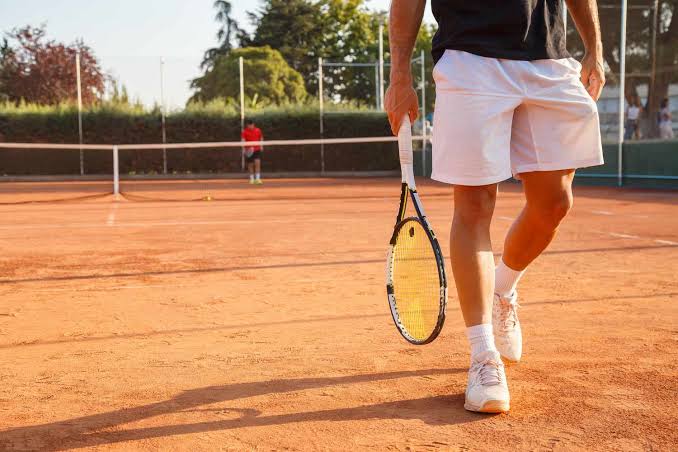If you play on acrylic or concrete tennis surfaces, choosing the right hard court tennis shoes can make all the difference not just in performance, but also in injury prevention. Hard courts are unforgiving, which means the wrong pair of shoes can quickly lead to foot fatigue, joint pain, or worse. In this guide, we’ll help you select the best footwear tailored to hard court play, breaking down what features matter, how they protect you, and which brands are leading the way in 2025.
Read Also: 5 Common Tennis Injuries and How to Prevent Them
Key Features to Look for in Hard Court Tennis Shoes

1. Outsole Durability
Hard courts wear down shoes quickly. Opt for models with modified herringbone patterns and abrasion-resistant rubber outsoles. Many brands now use high-density rubber compounds in high-wear areas to increase longevity.
Alt text: Close-up of hard court tennis shoe outsole with modified herringbone pattern
2. Midsole Cushioning
Since hard courts offer no natural shock absorption, the shoes must do the job. Look for EVA foam, gel inserts, or proprietary cushioning systems (like Nike Zoom or Adidas Bounce) that absorb impact and protect your knees and hips.
3. Lateral Support
Frequent side-to-side movement requires reinforced sides, TPU shanks, and medial stabilizers. Some shoes also feature asymmetrical lacing systems to reduce stress during abrupt movements.
4. Fit and Comfort
Fit is personal some players prefer snug, sock-like fits, while others go for roomy toe boxes. Try on your pair with tennis socks and walk around to test hot spots, pressure points, and arch support.
Best Hard Court Tennis Shoes in 2025
Hard courts can be unforgiving on both your body and your gear. That’s why the right pair of tennis shoes isn’t just about style; it’s about support, durability, and performance. In 2025, brands have stepped up with innovative designs and advanced cushioning to help players move faster, stay stable, and protect their joints. Here’s our roundup of the best hard court tennis shoes to keep you at the top of your game this year.
1. NikeCourt Air Zoom Vapor Pro 2

Nike’s latest update focuses on lightweight speed and lockdown fit. The Air Zoom unit in the forefoot gives responsive cushioning, while the updated outsole provides reliable grip on hard surfaces.
2. Asics Gel-Resolution 9

Asics is known for comfort, and this model doesn’t disappoint. It uses Dynawall and Dynawrap tech for added stability during lateral moves, plus GEL cushioning in heel and forefoot.
3. Adidas Adizero Ubersonic 4

This is a top choice for aggressive baseliners. It offers a sock-like fit, responsive midsole, and durable Adituff toe guard for sliding and stops on hard courts.
4. New Balance Fresh Foam Lav v2

Co-developed with Milos Raonic, this model combines plush Fresh Foam X cushioning with a snug bootie design for excellent comfort and traction on hard surfaces.
Mistakes to Avoid When Buying Hard Court Tennis Shoes
1. Choosing All-Court Models
While they might seem versatile, all-court shoes often lack the outsole durability and cushioning required for frequent play on hard courts.
2. Going Too Cheap
Budget tennis shoes often sacrifice in critical areas like arch support, lateral reinforcement, or rubber quality. You end up replacing them faster, making them more expensive long-term.
3. Ignoring Your Foot Type
If you overpronate or have high arches, you’ll need added arch support. Many players benefit from custom insoles or models designed for specific foot types.
When Should You Replace Your Hard Court Tennis Shoes?
A good pair of hard court tennis shoes should last between 45–60 hours of play. Watch for signs like:
- Outsole tread flattening
- Reduced cushioning feel
- Heel instability
- Toe dragging holes
Pro tip: If you rotate between two pairs, they’ll both last longer and give you consistent performance.
Why the Right Shoes Matter on Hard Courts
Unlike clay or grass courts, hard courts put more pressure on your joints, especially knees and ankles. They offer high bounce and consistent speed, which leads to more intense lateral movements and abrupt stops. That is why hard court tennis shoes need extra cushioning, durable outsoles, and solid lateral support.
Wearing regular running shoes or all-court models without proper reinforcement can increase your risk of injuries like plantar fasciitis, stress fractures, or knee strain. That’s why it’s essential to invest in shoes specifically designed for hard court performance.
Read Also: 4 Best Tennis Rackets for Beginners (2025 Guide)
Tips for Taking Care of Your Shoes
- Clean regularly: Remove dirt and debris after each session to preserve grip.
- Air them out: Avoid odor and moisture build-up by airing shoes after play.
- Store properly: Keep them away from direct sunlight or heat which can break down foam and glue.
The right shoes for hard court tennis are not just about style or brand they are about keeping you comfortable, agile, and injury-free. Whether you’re a casual weekend warrior or an aspiring tournament player, investing in the right pair now can prevent long-term issues and elevate your game.


